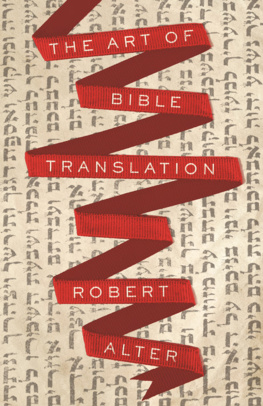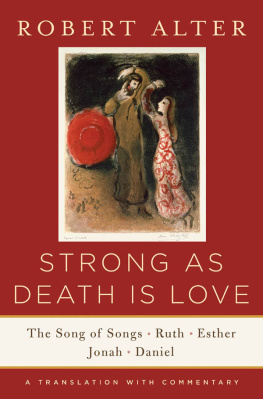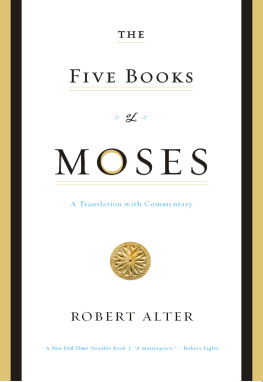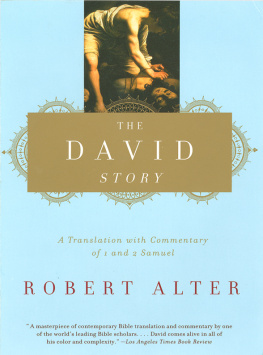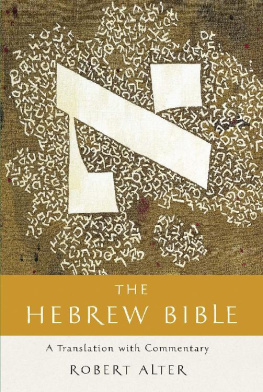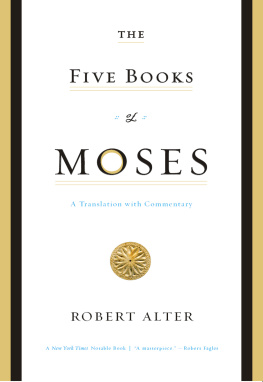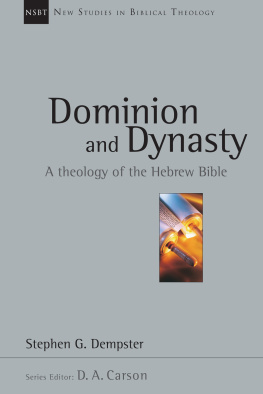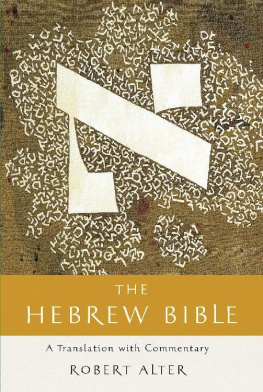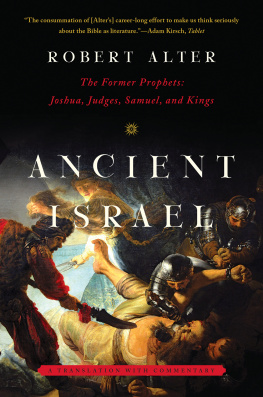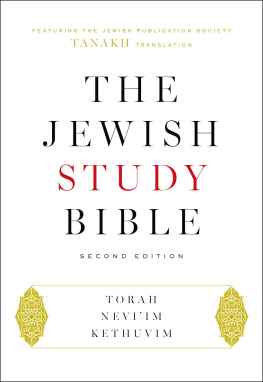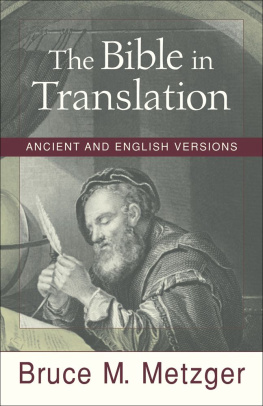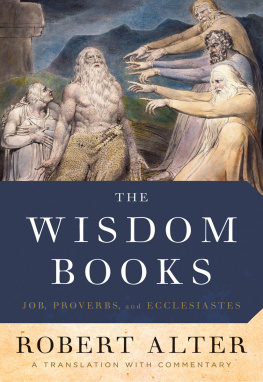
THE ART OF BIBLE TRANSLATION
THE ART OF
Bible Translation
Robert Alter
PRINCETON UNIVERSITY PRESS
PRINCETON & OXFORD
Copyright 2019 by Robert Alter
Requests for permission to reproduce material from this work should be sent to
Published by Princeton University Press
41 William Street, Princeton, New Jersey 08540
6 Oxford Street, Woodstock, Oxfordshire OX20 1TR
press.princeton.edu
All Rights Reserved
LCCN 2018963488
ISBN 978-0-691-18149-3
British Library Cataloging-in-Publication Data is available
Editorial: Fred Appel and Thalia Leaf
Production Editorial: Kathleen Cioffi
Jacket Design: Faceout Studio, Lindy Martin
Jacket Art and Texture: Shutterstock
Production: Erin Suydam
Publicity: Tayler Lord
Copyeditor: David Hornik
This book has been composed in Miller
Printed on acid-free paper.
Printed in the United States of America
10 9 8 7 6 5 4 3 2 1
For Nitza and Ilana,
dear friends and always intelligent cheerleaders
CONTENTS
AUTOBIOGRAPHICAL PRELUDE
MANY READERS OF THIS BOOK will be aware that I was engaged in translating the Bible for more than two decades, during which, I should add, I also continued to pursue my interests as a critic of modern fiction. Inevitably, what I have to say now about translating the Bible will in some sense be a defense of my own work, though it is more accurate to say that it is an argument for the necessity of what I have aspired to do, however uneven the achievement. Any translation of a great piece of writing is bound to be imperfect, and in what follows I will be offering some examples of imperfections in my own efforts. The practice of translation, as I have learned from experience, entails an endless series of compromises, some of them happy, some painful and not quite right because the translator has been unable to find an adequate English equivalent for what is happeningoften brilliantlyin the original language. The reflections in this book, then, on translating the Bible are offered in a spirit of humility, not triumphalism, with the underlying point that I have tried to do in my English version of the Bible what other translators by and large have not seen the need to do because they have had at best only a patchy sense of the literary aspects of the Hebrew.
I came to the translation of the Bible through two different accidental circumstances. My training and the initial focus of my work as a scholar were on European and American literature from the eighteenth century to the present and on modern Hebrew literature. I had long been fascinated by biblical narrative (by the time I was twenty I had a good competence in ancient as well as modern Hebrew) but was unable to explain why it was so great when, in the strict economy it exercised, it seemed so spare and perhaps even simple. Some fifteen years into my career, having published three books on the novel, I began to think that I might be able to offer some partial account of the literary greatness of biblical narrative, and I wrote an article, which at the time I conceived entirely as a onetime foray into the subject, on the need for a rigorous literary perspective on the Bible, bolstering my rather feisty contentions with a close reading of Genesis 3839. The extent of the response, most of it enthusiastic, took me by surprise. Well, I thought, I have a few more ideas on biblical narrative, so I might write another article. Before long four articles were in print, some of them putting forth ideas I hadnt realized I had to begin with. I was then in full momentum to produce a book on the subject, which became The Art of Biblical Narrative (1981). All along I imagined that I would get this biblical business out of my system and go back to writing on Stendhal, Flaubert, Dickens, Agnon, and Nabokov. The book, however, was widely reviewed and enthusiastically received, which encouraged me to begin work on a companion volume on biblical poetry. By that point I had slid down the slippery slope into biblical studies, where I continued to labor alongside my work on the novel.
The second accident occurred in 1993, when the amiable and astute Steve Forman, who was to become my editor at W. W. Norton, paid me a visit and asked whether I might be interested in doing a Norton Critical Edition, either of something from Kafka (on whom I had then recently written) or from the Bible. I should explain for those outside the academic world that the Norton Critical Editions are admirable teaching texts, providing helpful annotations to classical works and in the back-of-the-book section, a variety of ancillary materialssources on which the writer drew, relevant correspondence, contemporaneous reviews, modern critical essays. I responded to Steve Formans proposal enthusiastically but also imprudently. One could do a really good Norton Critical Edition of Genesis, I told him, because there was now an abundance of excellent critical and source materials for the back of the book, but the problem was that there was something wrong with all the existing translations, so that if I were to undertake such an edition, I would have to do my own English version.
After some discussion involving my always dependable agent, Georges Borchardt, and the people at Norton, we agreed on a book that would be a straight translation and not a Norton Critical Edition. Initially, I thought I would merely provide occasional translators notes to explain word play that could not be conveyed in English or to alert readers to points in the text where the meaning of the Hebrew was uncertain. But I had not gotten halfway through the first chapter of Genesis before I discovered that there were all sorts of things going on in the Hebrew, many having to do with its literary shaping, that had not been discussed in the conventional commentaries and that I wanted to take up. I thus found myself launched on still another unintended enterprise, a commentary to accompany my translation. I have to say that this gave me a certain sense of connection with the great medieval Hebrew commentatorsespecially my two favorites, Rashi and Abraham ibn Ezrawhom I had admired since late adolescence. I found it rather amusing, a few years later, when John Updike, in a New Yorker review of my Five Books of Moses, wondered, rather querulously, why anybody needed the commentary, which made the book ponderously heavy to hold, since the King James Bible, after all, had done quite nicely without a commentary. Updikes objection, I would say, was an eminently Protestant way of thinking about the Bible, and also did not register an awareness that King James opposed the inclusion of a commentary because he feared it would provide a vehicle for anti-monarchic views, as had the marginal comments in the Geneva Bible before it.
When I began work on Genesis, I thought of it as a perhaps quixotic experiment. I was aspiring to get into English as much as possible of the literary mastery of the Hebrew, but, aware as I was of the vast differences in structure and semantic range between the two languages, I was afraid that what I was trying to do was unfeasible, and that everyone, including me, would hate the finished product. The completed translation, inevitably, was no more than an approximation of what I had in mind, but it turned out to be a better approximation than I had thought I could manage. The reviews were quite laudatory; even the sales were strong; and so I was encouraged to undertake more Bible translation.
Let me hasten to say that at the time I had no notion whatever of translating the entire Hebrew Bible. After Genesis, I decided to do my other favorite piece of biblical narrative, the David story (1 and 2 Samuel and 1 Kings 12). After its publication, Steve Forman came on a trip to San Francisco and, over a congenial dinner, asked whether I was interested in doing more Bible translation. I told him, yes, I was enjoying both the work itself and the critical response to it. What do you have in mind, he asked, to do next? I told him I could make a neat little volume of several short biblical books that I liked. He frowned and explained, quite reasonably, that there wasnt much marketing context for miscellaneous books of the Bible. He then took me aback by saying that, ideally, he and his colleagues at Norton would love me to translate the whole Hebrew Bible. Only four obvious words could answer such a proposal: give me a break. We continued our conversation, however, and ended up raising the possibility that I might do
Next page
